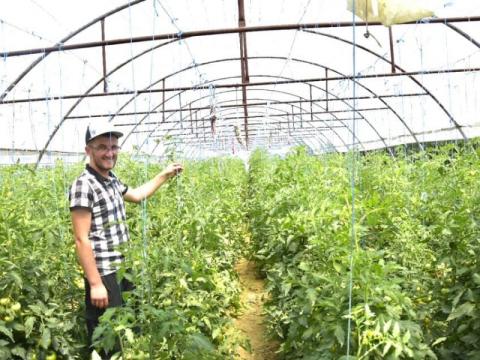Full heart - Full hands

We found Igli working amid three tomato varieties that he had grown in his 500 m2 greenhouse. He tells us about the pink tomato and the other two tomato varieties he planted in the greenhouse in his and his parents' backyard. He believes he inherited his father's love for the land, but the most significant decision he made was to stay in Albania, to wake up early in the morning to look after the products, and not to move to Germany, Italy, or France. He says this while informing us about the unique greenhouse he developed in this area. The baton was passed to Igli when his father left the group of farmers formed by World Vision in the village of Libonik due to his age.
“I've always told him,” says Anesti, Igli's father, “that the land will never leave you empty-handed. That the land will reward your hard work. That working in agriculture will give enough income to sustain yourself and your family.”
The 23-year-old graduated from the University of Korça in Language and Literature. Despite this, it appears that agriculture holds a special place in his heart. “The land gives me energy. Every day I think about production, what to add, what to leave out,” Igli says, reflecting on his accomplishments as well as the challenges he has faced. Farmers say it is tough to cultivate in Albania and obtain good crops at a time when the market is unregulated and you are not sure whether you will be able to sell. Igli, on the other hand, has not been deterred by these challenges. Even when more than a quarter of the crop was in risk of being lost due to this year's frosts, the young man remained unmoved.
“Do you see how I introduced this pink tomato variety?” he asked. “This prevented the destruction of other seedlings that were threatened by frost. The pink tomato even helped to restore seedlings that had been damaged.”
Igli learned all this this at a training cycle offered by World Vision for him and 400 other farmers in the Korça area. Farmers like Igli were introduced to a new worldview in agriculture as part of this training cycle, with the goal of empowering them via a new perspective on sustainable agriculture.
“I see my future here; I don't want to move abroad,” Igli adds, his eyes brightening as he observes the progress of his fruits in the greenhouse. If his days seemed empty before, with no major purpose, no important activity other than school and lessons, he now feels more fulfilled, more accomplished, and has the sense that he is doing something great in life, and most importantly, that his life has a purpose, since he began working in agriculture.
“Now I'm more energetic,” he says, reinforcing what we have seen with his activities. “Before, the day was empty and pointless. Now it's full of activities.” In addition to changing their thoughts about sustainable agriculture, Igli and other Korça farmers have received training on vegetables, fruit, diseases that might affect them, how to cure them, which medications do not risk oversaturating production with chemicals, and so on. “Today, everything is possible,” Igli says. “World Vision has taught me invaluable lessons, and I have managed to create an organic product that can be tested for chemical load at any moment and will come out clean. My nitrate load production has been tested by clients, and the result has been green, indicating that my tomato has been within the nitrate rate.”
Igli seemed to have patiently learnt what he needed to know to ensure a good production. The COVID-19 pandemic had a negative impact on Igli as well, but not because he could not care about production, but because market balances were disrupted.
The young man has every right to brag about his 1,500 tomato seedlings, which he treats as if they were his own children. “Can you see that? I have given it specialized irrigation and drilled a well with a probe to ensure that every root gets water. The water is very clean, and it is safe to drink.” Igli and his family cultivate 7.5 dynym of agricultural land and plant it with a variety of crops, with a particular focus on medicinal plants, which are in high demand on the market.
“Every information I got at World Vision has been important, and gathering farmers and talking to each other is also valuable because we learn from one another,” Igli says as he plucks two or three tomatoes to demonstrate his most precious asset—agriculture.